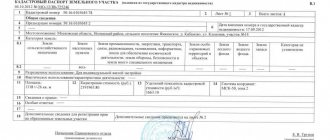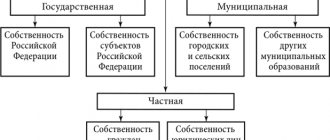Home / Real estate / Land / Ownership / Forms of ownership
Back
Published: 07/14/2017
Reading time: 12 min
0
348
The presence in the civil legislation of the Russian Federation of several different forms of ownership in which property may be located provides the opportunity to own it to many different entities.
One of the basic rights of property is public, which applies to real estate owned by the state. Next, the concept of this type of right, the grounds for its occurrence, as well as the distinctive features will be examined in more detail using the example of this type of real estate such as a land plot.
- Concept and legislative regulation
- Reasons for occurrence
- What areas can be publicly owned?
- Rights and obligations of participants
- Differences from private property
Property of public legal entities: what does it mean?
Since a public legal entity, that is, the state, is the owner of some property, it disposes of this property in the interests of the citizens of the country. State-owned lands are the property of the people, but can belong to individuals or legal entities under special conditions.
Land plots of public property have a number of features:
- they can only be transferred under a lease agreement and cannot become the subject of a pledge;
- the tenant does not have the right to dispose of the plot on his own behalf.
The state may own not only land plots, but also real estate such as residential apartments or houses.
Public ownership can be divided into types:
- state-owned, owned by individual constituent entities of the Russian Federation and the state as a whole;
- municipal, including the property of settlements, urban formations and other similar entities.
Video: Public Property Rights
This is told by a lawyer with extensive experience in conflict situations, Ivan Medvedev. If you need to fully understand this topic, then watch this lecture to the end.
Still have questions? Find out how to solve your particular problem - call the hotline right now or write to our consultant.
Property is not just property, but also a complex category that determines economic relations in society, a complex of legal and civil rights of subjects. It has been formed on Earth for thousands of years. During this time, many forms of ownership were generated, from the ownership of ancient tools and manufactures to modern corporations and syndicates. In Russia there is private and common property, each of which has its own varieties. Owners can be citizens, legal entities, corporations, the state, societies and organizations. But what does the property of public legal entities mean, and what principles of law are embedded in it?
The legislative framework
Until 1990, the main form of land ownership was state. With the beginning of the privatization process, many objects were transferred to the private ownership of legal entities or individuals. Part of the land was transferred to municipal disposal.
Legislative framework regulating the circulation of public property:
- Land Code of the Russian Federation;
- Civil Code of the Russian Federation.
Chapter 3 of the Land Code of the Russian Federation regulates the procedure for the emergence and regulation of property rights to land plots. If we talk about the grounds for the emergence of state property, we should refer to Article 17.
The Civil Code in Article 218 lists the grounds on which property rights arise:
- as a result of a transaction in accordance with the law (under a civil law agreement);
- by obtaining land that does not have an owner;
- when a new plot is formed as a result of merger or division.
An additional basis is contained in Article 18 of the Land Code of the Russian Federation - this is a gratuitous allocation from federal property.
Forms of land ownership
- State property (Article 16 of the Land Code of the Russian Federation).
State property is land that is not owned by citizens, legal entities or municipalities.
Subjects of state property rights:
- Russian Federation represented by government bodies;
- constituent entities of the Russian Federation represented by their authorities;
- state enterprises and institutions;
- enterprises and institutions of the constituent entities of the Russian Federation.
Objects of state property rights:
- land plots assigned to state enterprises and institutions;
- land plots assigned to enterprises and institutions of the constituent entities of the Russian Federation.
The division of state ownership of land into property of the Russian Federation (federal property), property of constituent entities of the Russian Federation and property of municipalities (municipal property) is carried out in accordance with the Land Code and other federal laws.
- Federal property
The following land plots are in federal ownership:
- which are recognized as such by federal laws (for example, the Forest Code, the Water Code);
- the right of ownership of the Russian Federation to which arose during the delimitation of state ownership of land;
- which were acquired by the Russian Federation on the grounds provided for by civil law.
- Property of the Subjects of the Russian Federation
The following land plots are owned by the constituent entities of the Russian Federation:
- which are recognized as such by federal laws;
- property rights of the subjects of the Russian Federation to which arose during the delimitation of state ownership of land;
- which were acquired by constituent entities of the Russian Federation on the grounds provided for by civil legislation;
- which were transferred free of charge to the subjects of the Russian Federation from federal property.
In the constituent entities of the Russian Federation - the federal cities of Moscow, St. Petersburg, Sevastopol, a land plot, the ownership of which the owner has renounced, is, from the date of state registration of termination of ownership of it, the property of the corresponding subject of the Russian Federation - the federal city of Moscow, the constituent entity of the Russian Federation – the federal city of St. Petersburg, the subject of the Russian Federation – the federal city of Sevastopol, unless the laws of the said subjects of the Russian Federation establish that such a land plot is the property of municipalities located on the territories of the said subjects of the Russian Federation.
- Municipal property
Subjects of municipal property rights:
- Municipal entities represented by local governments;
- municipal enterprises and institutions.
Objects of state property rights are land assigned to municipal enterprises and institutions.
The following land plots are in municipal ownership:
- Recognized as such by federal laws and laws of constituent entities of the Russian Federation adopted in accordance with them (for example, the Federal Law “On the Entry into Force of the Land Code of the Russian Federation”);
- The right of municipal ownership to which arose during the delimitation of state ownership of land;
- Acquired on the grounds established by civil law;
- Transferred into municipal ownership free of charge from federal property.
Unless otherwise provided by other federal laws, a land plot, the ownership of which the owner has renounced, is, from the date of state registration of termination of ownership of it, the property of a city district, urban or rural settlement, or if such a land plot is located on an intersettlement territory, the property of a municipal district at the location of the land plot.
To ensure their development, lands owned by constituent entities of the Russian Federation, including those outside the boundaries of municipalities, may be transferred free of charge to the ownership of municipalities to ensure their development.
Land owned by constituent entities of the Russian Federation may be transferred free of charge into municipal ownership in order to provide it to certain categories of citizens and (or) non-profit organizations created by citizens.
Land plots owned by constituent entities of the Russian Federation, municipal property, can be transferred free of charge to the ownership of constituent entities of the Russian Federation - federal cities of Moscow, St. Petersburg, Sevastopol for the purpose of providing them to certain categories of citizens in accordance with subparagraph 6 of Article 39.5 of the Land Code, as well as certain categories of citizens and (or) non-profit organizations created by citizens, in cases where the grounds for free provision of land to these persons are provided for by this Code and other federal laws.
- Private property
Subjects of private property rights are:
- Individuals
- Legal entities
The objects of private property rights can be any property, in this case land plots that are not state or municipal property.
Legal entities and citizens enjoy equal access to acquiring land ownership.
Land plots can be provided to citizens and legal entities from state or municipal property. The exception is land plots that, in accordance with the Land Code and federal laws, cannot be privately owned. For example, land that has been withdrawn from circulation, public land plots, and land plots of specially protected natural areas cannot be given into private ownership.
Foreign citizens, stateless persons and foreign legal entities cannot have ownership of land plots located in border territories, the list of which is established by the President of the Russian Federation in accordance with the federal legislation on the State Border of the Russian Federation, and in other specially established territories of the Russian Federation in in accordance with federal laws.
Features of the implementation of the right
Public legal entities may use, own and dispose of property within the limits of their competence. All rules relating to this issue must be regulated officially at the level of issuing relevant regulations.
All rights to state or municipal property belong to the government, which can, in turn, delegate powers to other executive authorities. These may be various departments, ministries, as well as regional and local authorities. They exercise all their powers regarding property rights by issuing their regulatory documents.
Plots of rural and urban settlements are municipal property and the implementation of property rights to them is carried out by local government bodies. As a rule, the state transfers land to municipalities free of charge. Similarly, plots are transferred to their department if there is an official refusal from the previous owners. They can go:
- unitary enterprises;
- municipal institutions;
- non-profit institutions;
- legal entities or individuals.
The concept of law at the basis of public property in the Russian Federation
According to the legislation of the Russian Federation, municipal property can be transferred to the population by order of the local administration. The authorities, at their discretion, divide the housing and land funds.
Dear readers! We cover standard methods for solving legal problems, but your case may be unique. We will help you find a solution to your problem for free
— simply call our legal consultant at:
+7 (Moscow)
+7( (Saint Petersburg)
It's fast and free ! You can also quickly get an answer through the consultant form on the website.
According to the concept of law, which is based on property rights, Russia has an Anglo-American version. This is when PPOs act as the main owners, and temporary users are individuals and legal entities.
Participation of public legal entities in property circulation
- Legal relations of public property . The object is the property belonging to the subject. A significant difference between public and private property is its use only for its intended purpose.
- Privatization and deprivatization. Public legal entities participate in privatization processes, and are also removed from private property into public property through confiscation and nationalization.
- Commitment relationships. Public legal entities, in accordance with Federal laws, participate in this type of legal relationship regarding the fulfillment of obligations under contracts, where they act as customers of work and services for government needs.
- Corporate relations. Public legal entities have the right to participate in the authorized capital of organizations. This occurs on the basis of legislation and is the state’s contribution to increasing the volume of capital.
The disposal and management of real estate and land plots owned by the state is carried out by the authorized body of the Federal Property Management Agency and its territorial units.
Transfer to private ownership
The transfer of property rights from PPOs to citizens is carried out in accordance with the legislation of the Russian Federation, namely the Housing and Land Codes. Land and real estate are provided free of charge to:
- large families;
- citizens who use land on a leasehold basis;
- citizens who received an allotment for farming;
- lands of dacha and garden cooperatives;
- citizens who received a land plot for construction.
Documentation
To register land as private property, a citizen must provide and collect the following package of documents:
- application for the provision of land;
- a copy of the passport and its original;
- act on the territorial location of the allotment;
- boundary plan;
- evidence that the land is being used legally;
- documents that confirm that the citizen has the right to apply for a plot of land as private property;
- receipt for payment of state duty;
- application for participation in the auction and protocol from its conduct;
- other.
Advantages and disadvantages
The advantages of this form of ownership include:
- Protection against fraudulent activities . Neither an apartment nor a plot of land that is transferred to a citizen by the state under a lease agreement can be easily transferred into private ownership. This discourages scammers, since dealing with such objects becomes unprofitable and even dangerous.
- No need to pay annual tax . The tenant pays only the amount billed under the contract, and paying taxes to the budget is the owner’s responsibility. The tenant does not take part in financial settlements.
- Loss of property entails replacement . This means that in the event of certain force majeure circumstances (due to fire, flood, emergency), public housing may be lost, but in return the citizen must be provided with other housing.
- Opportunity to improve living conditions . If the family grows and the sanitary standards of living space per person do not meet, the state is obliged to provide housing that is larger in size.
The disadvantages of the public form of ownership include:
- Inability to make any real estate transactions because you are not the owner. It cannot be given away, exchanged, sold, etc.
- There is a risk of losing the property. The tenant is obliged to strictly comply with all the rules and requirements that the state imposes on the use of property. If they are violated, the citizen faces eviction without being provided with another in return.
The disposal of state and private property differs significantly in this regard. All aspects regarding federal or municipal property are dictated by the relevant legislative acts. The citizen disposes of private property independently in full and within the established norms.
Disposal of public property
Public structures have the right to own and dispose of property within the framework of their powers. This right is implemented through normative and legislative acts; for its implementation there are ministries, departments, and executive bodies of different levels of government.
There are several forms of disposal of property objects that can be carried out by public legal structures.
- Legal relations of public property, in which the object is directly state property. Public property can only be used for its intended purpose, unlike private property.
- Privatization. This includes the most common example of the privatization of apartments by the citizens living in them.
- Deprivatization. This is the reverse process, when property is removed from private ownership through nationalization or confiscation.
- Corporate forms of relationship. Public legal entities have the right to make a contribution to the authorized capital of private companies or buy out part of the share.
In addition to the legal relations indicated above, public organizations can participate in inheritance matters, for example, acquiring escheated property. Unitary enterprises are created exclusively on the basis of public property.
State bodies are responsible for ongoing legal relations. If the foreclosure is satisfied, the person's claims are satisfied from the budget or at the expense of public property.
The handling of public property is regulated by the Land and Civil Codes of the Russian Federation. They talk about the right of privatization, separation from federal ownership free of charge and the possibility of leasing property.
What it is
According to the standards of the Russian Federation, property in the country is divided between certain entities, the most famous of which are private owners, that is, citizens, and organizations, then the property is called corporate.
Thus, public legal entities can also own property, and on a national scale this is both the state itself, and subjects, and even municipalities.
From this, the basic rule is that the property of such entities is everything that does not belong to organizations or individuals.
The state can dispose of its own property at its discretion, and even transfer it to private individuals or companies, but there must be separate reasons for this, proving the need for this procedure.
But property of other forms of ownership can also become the property of public legal entities, for example, if land or real estate is alienated for debts, or a person dies and has no heirs or legal successors.
What are the branches of the form?
Public property is divided into types:
| State | This includes property that belongs either to central authorities or regional entities |
| Municipal | Belongs to cities, towns, villages and other components of regions, districts and other larger formations |
Decisions regarding the fate of this property are made by authorities and responsible institutions, and specific verdicts are made only after discussion and study of documents.
Abuse of this right is punishable by law and the criminal code, since the unmotivated transfer of property to other entities may be part of a criminal scheme.
Photo: diagram of public legal entities
Therefore, all decisions regarding the disposal of things belonging to the state or municipal authorities must be transparent and benefit the budget.
The legislative framework
In the Soviet Union, land ownership was the prerogative of the state, and other participants could only obtain it for temporary use, as in the case of real estate.
Privatization allowed many citizens and legal entities to acquire ownership of objects, but at the same time, some of them also fell into the hands of municipalities.
Among the legislative acts that regulate the public form of ownership are the Land and Civil Codes.
Thus, Chapter 3 of the Land Code of the Russian Federation stipulates the procedure for the emergence and regulation of rights related to land. But state ownership of territories is described in Chapter 17 of the same document.
The Civil Code also regulates property; for example, Article 218 stipulates the basis on which rights to property arise.
These include:
| Legal deal | Which involves the formation of a civil contract |
| Getting land | Which has no owner |
| Formation of a new site | By combining several or dividing a larger one |
| Allocation from the federal fund free of charge | — |





